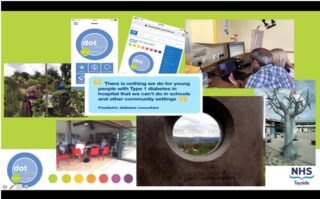Q Exchange
Diabetes Out There – move services for young people away from hospital
- Idea
- 2019

Meet the team
Also:
- Elaine Wilson, MCN Manager
- Vicky Alexander, Consultant Paediatrician
- Vicki Dunbar, Clinical Psychologist (Paed)
- Jennifer Soutar, Project Support
What is the challenge your project is going to address and how does it connect to your chosen theme?
Overall diabetes control, as measured by HbA1c deteriorates in adolescence, with more than a third of young people having HbA1c in high risk range. These individuals are at increased risk of hospital admission due to the short and long term complications of diabetes as they move into adulthood. The cost of diabetes related morbidity is significant. There is also a small but significant mortality in this young cohort of patients. Non-attendance rates at clinic can be high (20-30%) and young people may be ‘lost to follow up’ as they move between paediatric and adult services. Non-engagement with health services is linked to poorer clinical outcomes for the person as well as wasted use of health service resource.
There is evidence of increased rates of anxiety and low mood in young people with diabetes. Few will meet criteria for CAMHS referral however, within different localities there may be appropriate services to access. The hospital based healthcare team is unlikely to know of these.
What does your project aim to achieve?
Diabetes Out There aims to:
1.increase the opportunities, quality and uptake of type of interaction with their health care team for young people with type 1 diabetes.
These include, individual review in school or college, use of virtual and physical consultations.
2. Establish group sessions, led by young people with diabetes, and facilitated by youth worker and team.
3. Increase understanding of support services locally for young people needing emotional and/or practical guidance. Youth worker to act as link between health care teams and the young person with diabetes.
4. Improve equity of service across region with community based activities offered in all areas.
Measures used will be of glycaemic control, contacts with healthcare team, acute attendance/admission to hospital, numbers of young people non-engaged. Improved health outcomes in adolescence will likely translate to significant reduction in health care costs in the future.
How will the project be delivered?
Diabetes Out There is evolving with a vision of a seamless service for young people with diabetes aged 0-25 years, principally delivered in community settings. A stakeholder event was held a few years ago including NHS clinical and management staff, young people with diabetes and 3rd sector organisations. There is experience in running sessions in the community eg schools, wildlife centre, community garden. In addition there is experience of running group activities where peer support and learning can be facilitated eg diabetes camp, work with Dundee repertory theatre.
The paediatric diabetes team have links with Duncan of Jordanstone college of Art and Design, the Green health partnership in Dundee and Dundee department of leisure and culture.
SCI-diabetes can be used to monitor outcomes and identify individuals at particular risk on a real-time basis.
Diabetes Out There is a work stream in our Transforming Outpatients programme – the lead of which is a Q member.
What and how is your project going to share learning throughout?
The project will be monitored through Transforming Outpatients. Learning can be shared on a weekly basis with the wider TOPs team. Further opportunities to share learning would be through NHS Scotland events, Diabetes Scotland, Q events and professional diabetes forums.
There is potential for valuable learning in how we can:
1. Consider how healthcare teams can deliver services for young people more effectively and more efficiently (for both staff and the service user).
2. Provide services for people with a long term condition in a setting that suits them.
3. Improve transitions between children’s and adult services
4. Better understand the health needs of young people with diabetes by employing the skills of a youth worker. This would be transferable to other health conditions
5. Explore ways to improve the accessibility and navigation of health services for young people and reduce health inequalities relating to geography and deprivation.
How you can contribute
- Embed robust quality improvement methodology to the project
- Learn from other Q members who have experience of similar projects
Comments
Aroon Lal 16 Jul 2019
Hi
This is a really interesting project in an important area. Oxford renal transplant service did something similar for adolescents living with kidney transplants and published some encouraging outcomes ( https://doi.org/10.1136/bmj.e3718 (Published 01 June 2012)) and I might be worth looking to see if some of their ideas might be transferrable to your project.
Comments are now closed for this post.